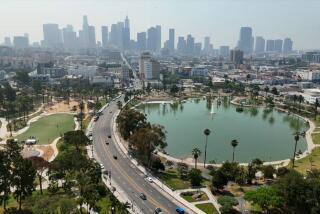Privatize Roads to Ease Clogging
- Share via
Los Angeles has maintained its ranking as the most traffic-congested urban area in the nation. This dubious honor was bestowed on the city for the 15th consecutive year by the Texas Transportation Institute, which found that Los Angeles-area drivers spent an average of 136 additional hours a year on the roads because of commuter congestion.
All the planning by all the government agencies has done nothing to solve the problem, and the problem never will be solved as long as the government tries to manage it. What is needed is a private-sector solution.
The problem of traffic congestion is what economists call a tragedy-of-the-commons problem. Basically, this means that because everybody gets to use something free, the resource gets overused.
Even assuming that the government could provide efficient highways, the tax system is unfair. Although tax dollars are pooled and doled out by the state Legislature and the federal government to general transportation funds, some people use highways more than others. Heavy highway users are taxed about as much as light users.
Gasoline taxes present an improvement over general fund taxes because they are proportional to one’s use of the roads, but they are still inefficient. Their collection is subject to the same wasteful bureaucratic structure as that of other taxes, and more money is wasted.
Privatizing highways, on the other hand, would accurately reveal the value of highway travel to each individual, allowing for an efficient exchange of property rights (your money for the highway owner’s permission to use his road). Everyone would pay a fair share for use of the roads.
When congestion increased because of holiday or commuter traffic, prices would increase to keep the optimal number of cars on the road and traffic moving smoothly. This would ensure that those who need to use the roads most, or must get to their destinations most quickly, would be the ones using the highways.
If a company charged too much, people would take alternate routes, seek other options, such as public transportation or decide that their trips were not worth it and save money by traveling at off-peak hours. The crucial truth is that private owners have a genuine interest (i.e., the profit motive) in serving their customers and providing the best quality of service; government agencies do not.
This capitalist approach calls for each individual to make decisions on price, time and method of travel and coordinates them all simultaneously in a way that no central government planner could ever hope to.
Carpool lanes merely make traffic worse in other lanes. By truly taking the costs of travel into account through a privatized system, people would be able to more accurately make related decisions about housing and job locations, among other things. Again, feats no urban planner could reasonably seek to emulate.
Private highways would present a cheaper, more efficient alternative to government management. They would provide the fairness of allowing each individual to make his own decisions as to the value of his travel and its alternatives, and to get what he paid for. The traffic problem deserves innovative solutions and innovative minds to implement them. Such can be found only in the private sector.






